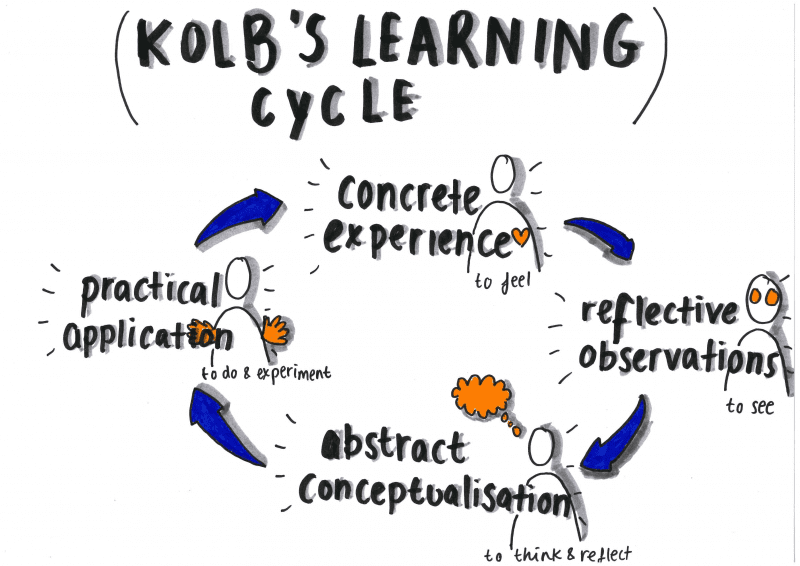iCRA’s philosophy on learning
iCRA’s services are designed to stimulate learning that builds on what participants already know and do. Our trainings give plenty of room for reflection and experimentation with new ideas and practices.
All of iCRA’s services are based on participative and experiential learning methods, with “Kolb’s Learning Cycle” (illustrated in below figure) as fundament. The goal of using these methods is to stimulate more of a learning culture in organizations and individuals.

The way iCRA designs its services depend on the needs at hand. Do the participating professionals require training or coaching? Will they themselves be trainers, coaches or facilitators? These types of nuances determine the design of our capacity strengthening services and the extent to which we include:
Training workshops
Training workshops help clients to understand and practise specific skills. One of the key skills iCRA focusses on is facilitation. Facilitation literally means “to make things easy” (‘Facile’ – in French or Latin and Fácil – in Spanish – is translated as “easy” in English). A facilitator does not have an attitude of knowing everything in a subject but helps a person or team to find solutions by building on what they already know. In an organisational setting, a facilitator helps people identify and achieve their objectives by leading them through processes to observe and analyse, plan, act, reflect and learn.
Facilitation literally means “to make things easy”
Facilitating meetings or processes does not come easily to most people. Especially when you need to deal with different types of people and organisations. To do this effectively, it helps to get a better understanding about social interaction processes and even psychological issues going on in the background. Becoming more (self-)aware of how people function in groups and getting a better grip on the various behaviours that can crop up in group settings helps to facilitate a meeting (and group processes) more effectively.
Coaching of facilitators
Few agricultural professionals are specifically ‘taught’ how to facilitate processes involving various stakeholders as part of their professional development. In fact, the ability to facilitate multi-stakeholder interaction in partnerships and networks can only be developed through experience. To bring about more effective partnerships, facilitators require diverse and complementary competences that are best developed and strengthened through interactive “learning-by-doing” in the field with their partnership actors. Well-designed coaching of facilitators can – however – greatly accelerate their learning curve and enhance their effectiveness.
Well-designed coaching can greatly enhance the effectiveness of facilitators.
Coaching involves supporting a partnership, organisation or individual to achieve a specific agreed goal by combining targeted training in new knowledge and skills with follow-up guidance, support and mentoring while the new skills are put in practice. Coaching therefore goes beyond a simple training. iCRA’s coaching of facilitators focuses on inter-personal skills needed to facilitate partnerships; such as: listening, communicating, empathic ability; the skills needed to coordinate and collaborate, to reflect and learn, to analyse and solve problems in response to changing contexts, to negotiate or to engage in strategic and political processes.
ICRA applies experiential learning principles in all of its services
Participants must be empowered to take ownership over the learning and innovation processes in which they are involved. Facilitation should build on what people already know and want to learn.
Learning (to innovate) is an interactive social process. The learning process needs to give space to participants to learn from each other, to work in groups, and to stimulate discussion.
Learning is an active, discovery-based, experiential process. Such learning is achieved through iterative cycles of learning new concepts, reflection, planning and action (putting new ideas and skills into practice), and more reflection to consolidate learning.
Learning processes need to be tailor-made to stimulate innovation. Ideally, learning approaches combine hands-on field experiences with structured “learning workshops”. These motivate participants to improve practices through relevant new knowledge (concepts), up-to-date skills (ways of doing things) and inspirational attitudes (ways of behaving).
